I Dig Sports
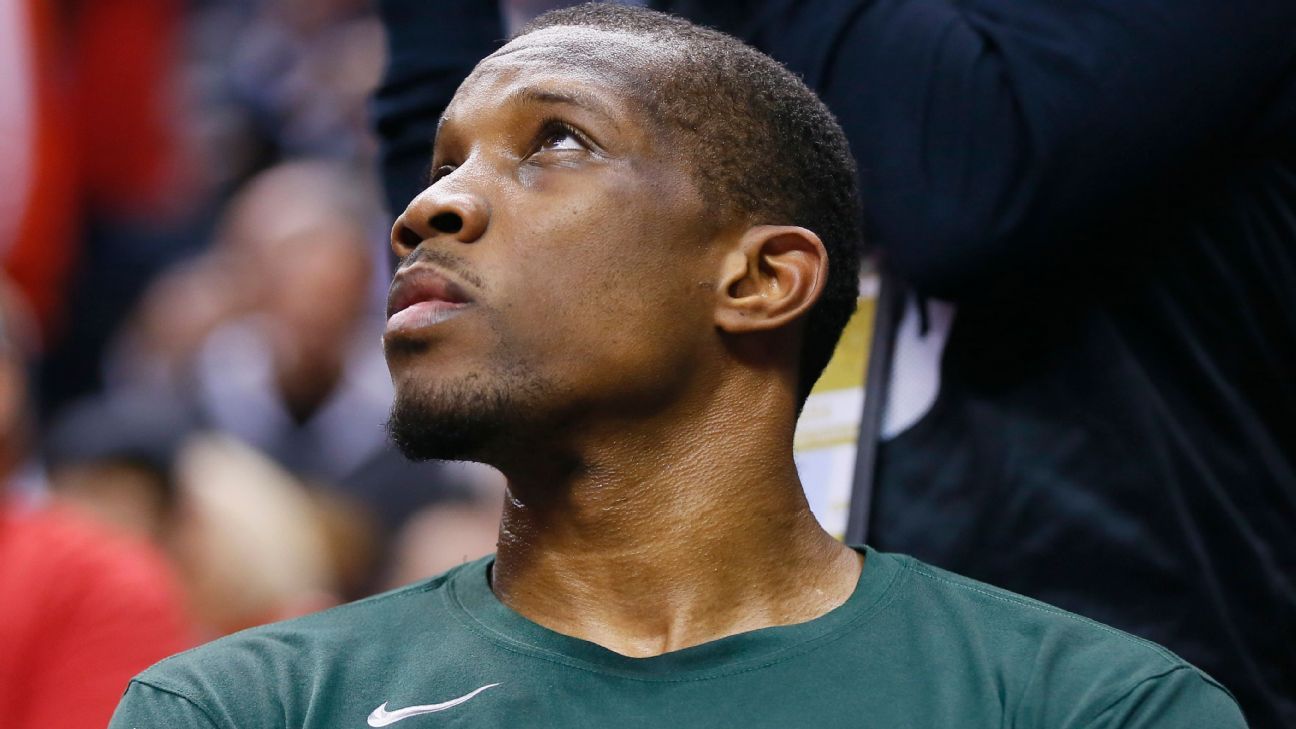
TORONTO -- The extra shots were supposed to help.
Giannis Antetokounmpo, Eric Bledsoe and Khris Middleton were the last people on the Scotiabank Arena court at morning shootaround Tuesday. The trio evaded the throng of journalists that had descended at center court, and instead shot extra free throws and put up a few more 3-pointers.
After shooting a combined 23 percent in Game 3, the three players were determined to play better than they had Sunday, and that meant squeezing in some extra repetitions.
Some improvements were made -- Antetokounmpo finished with 25 points, 13 more than he had in Game 3 -- but it wasn't enough. The Milwaukee Bucks dropped Game 4 of the Eastern Conference finals to the Toronto Raptors 120-102, only the second time this season they have lost back-to-back games.
The series now heads back to Milwaukee tied at two games apiece.
"We just came out flat in the third quarter," Antetokounmpo said. "It's something we can get better at -- something we can fix."
The Bucks were down by just one point at the half, but then the game quickly unraveled for Milwaukee.
The shooting issues that have plagued Bledsoe all postseason continued in Game 4. Through the first two rounds of the playoffs this year, Bledsoe averaged 16 points. Against the Raptors in the conference finals, though, he is averaging 8.3 points.
"For Bled, it's just making sure he understands we wouldn't be here without him," Pat Connaughton told ESPN. "Everybody gets frustrated with themselves when they are not playing well because they feel like they are letting the team down. He wants to play well for his teammates."
Bledsoe finished with only five points on 2-of-7 shooting. He was 0-for-2 from 3-point range and played only 20 minutes, five less than any other starter. He hustled out of the locker room before most of his teammates had even begun showering. On his way to the bus, he shrugged off questions and assured bystanders he would be all right.
The Bucks' system is built to withstand an individual player's shooting slump, but Bledsoe is frustrated with just how long he has struggled to find the basket. According to Second Spectrum tracking, Bledsoe is shooting just 27 percent on his jump shots this postseason, the worst among all players with at least 50 attempts.
"I tell him just forget about it," Middleton told ESPN. "That's the only way you can play better, is if you stop thinking about it so much."
Malcolm Brogdon wobbled, too. He shot just 2-of-11 and finished with four points. Before Tuesday, Brogdon hadn't scored fewer than 14 points all series.
"A plethora of things went wrong," Connaughton said. "We weren't able to withstand adversity the way we normally do."
The Bucks' locker room after the game was eerily silent. Players didn't speak to one another -- not even in a whisper. The loudest sound was the whirring ceiling fan and Antetokounmpo's cellphone alarm notifying him it was time to take off his ice bags.
"The series is two to two," Middleton said. "It's not the end of the world. I know Game 5 is going to be a dog fight."
Tagged under
'It's the Kawhi effect': The impact of having a transcendent star
Published in
Basketball
Wednesday, 22 May 2019 00:18
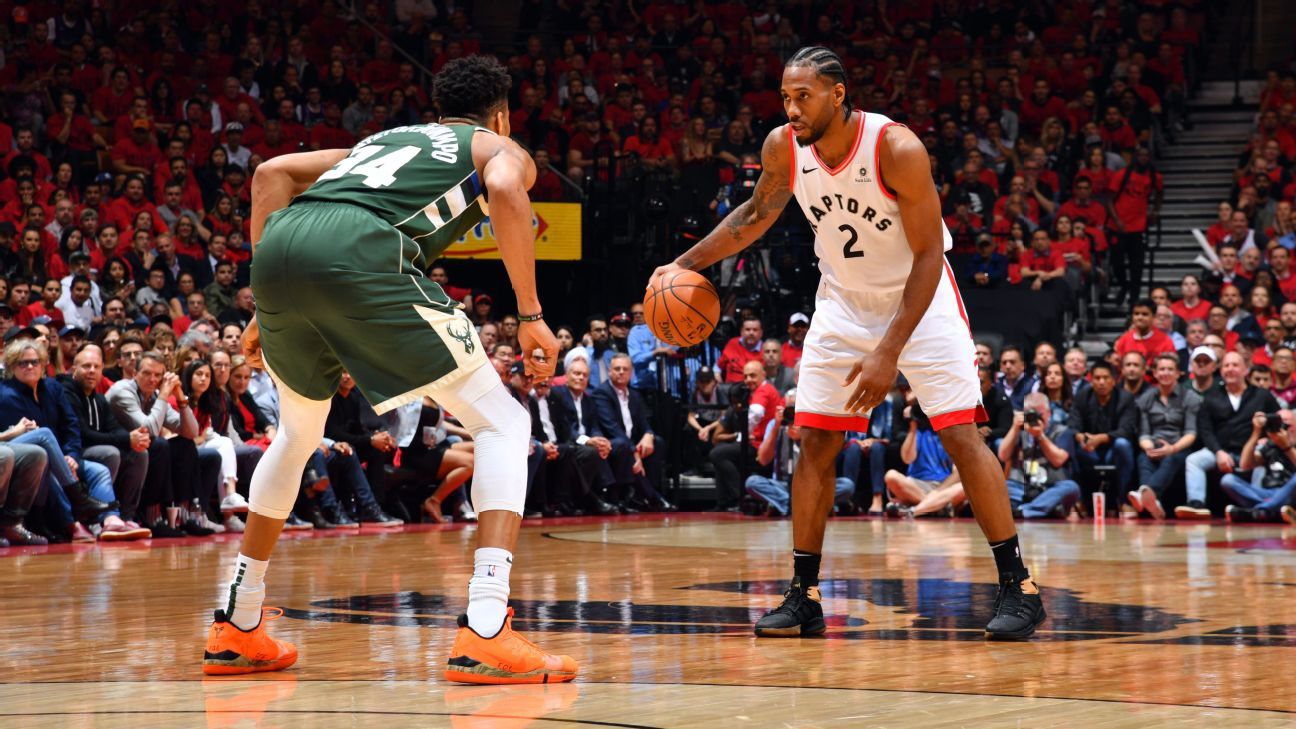
TORONTO -- In the parlance of the Toronto Raptors, it's called "Drive-Kick-Swing." Though it's a mainstay in the Raptors' playlist of practice drills, Drive-Kick-Swing was on full display under the bright lights of Scotiabank Arena in Game 4 of the Eastern Conference finals on Tuesday night.
In the third quarter, Kawhi Leonard was at the controls, the "Drive" in Drive-Kick-Swing. Leonard was being influenced to drive left -- as he has been all series by Milwaukee Bucks defenders -- by guard Malcolm Brogdon. Leonard obliged and, as has also been the case this series, encountered two additional defenders as he reached the paint.
Hounded by multiple bodies after picking up his dribble, here comes the "Kick": Leonard passed the ball out to Fred VanVleet out on the left wing beyond the arc. With so many defensive resources committed to Leonard, Bucks guard George Hill had to account on the left side of the floor for both VanVleet and his teammate, Norman Powell, alone in the corner.
Finally, the "Swing." As Hill closed on VanVleet, the Raptors' backup point guard dished the ball to Powell. Of Powell's team-leading 18 field goal attempts in Game 4, this shot was the most delectable -- open corner 3-pointers are the mother's milk of NBA basketball in 2019. Powell drained it to put the Raptors up 10 points.
The lead would never again narrow to single digits, as the Raptors received massive contributions from their full complement of players to pull away to a 120-102 victory, and even the series at 2-2.
"Kawhi is going to get attention all the time, no matter what," Raptors point guard Kyle Lowry told ESPN. "It's the Kawhi effect."
The privilege of having a transcendent superstar like Leonard isn't just the gift of the singular performance that wins a game, though Leonard has done plenty of that over the past six weeks of the postseason. The team also enjoys the ability to leverage a defense like Milwaukee's that devotes its full weight and diligence to stopping Leonard.
"He's going to carry us some games -- he's a superstar," Lowry said. "But then you have nights like tonight when he just let everyone else do their thing and he doesn't have to carry as much. In the first quarter, he didn't touch the ball all that much. But we attacked and moved the ball off the attention he attracted."
Easing Leonard's load was imperative for Toronto because the three-time All-Star came in still gassed from Game 3. Though there has been no specific diagnosis and Leonard insists he feels good, Raptors coach Nick Nurse characterized his best player as "tired," and Lowry said he was "a little bit limited." Leonard's 19 points were his lowest output since Game 3 of the Raptors' first-round series against Orlando, a night he was under the weather.
The Bucks' top-ranked defense has established and refined its principles over the course of the regular season and playoffs. While Milwaukee has introduced a tweak or two against specific matchups, its broad strategy hasn't changed. The Bucks are fully committed to packing the paint to ward off penetration and prevent easy shots inside. Help will be dispatched from marginal and even some average shooters, which will leave some open shots on the perimeter. So long as the integrity of the interior defense isn't compromised, this is a trade-off Milwaukee is content to live with.
Accordingly, Raptors center Marc Gasol shot the ball from beyond the arc six times in Game 4 (converting three), and Powell attempted 13 3-pointers. In total, the Raptors have attempted 40 uncontested shots over the past two games, according to Second Spectrum tracking, and converted them at an effective field goal percentage of 61.3. Over the first two games in Milwaukee, they also found 40 uncontested shots -- but hit them at an effective field goal rate of only 47.5 percent.
"With Kawhi having the ball, he draws so much attention," Powell said. "So it's opening up a lot for us on the weak side. We're just trying to play through him a little bit, play through Marc. I think Marc did a phenomenal job of breaking down the defenses when he had the ball up top on cuts, on screens. I think we're just playing for one another. Everybody is talking on what we see and how we can get better looks and try to get a shot up every time. We're staying confident in one another."
Gasol led the team in assists Tuesday night, an important indicator the Raptors have reclaimed their identity as a high-IQ outfit that can generate shots creatively at multiple spots on the floor. Gasol was a master at the top of the floor, leading Leonard into the lane with a little drop pass for an easy bucket after Khris Middleton denied the pass out on the perimeter. Gasol and Leonard paired up again about a minute later with a heady backdoor sequence when Middelton again got caught on the high side.
When the Raptors fail to hit open shots as they've done so frequently over the past few weeks against Philadelphia and Milwaukee, it's easy to forget about the collective intelligence of the outfit. But Leonard, Gasol and Lowry conducted an honors class in basketball IQ in Game 4. Lowry led the team with 25 points, including a 10-for-10 night at the free throw line, the product of some heavy manufacturing -- turning broken possessions into meaningful points by simply drawing contact against a destabilized defense.
Both VanVleet and Serge Ibaka have struggled through long stretches of the postseason, but each thrived in his role in Game 4. VanVleet posted a perfect 3-for-3 from long range to score 13 points and dished out six assists in 25 minutes. Meanwhile, Nurse gave his backup big man Ibaka a directive to go out and wield his athleticism as a blunt object. Ibaka responded by helping Toronto accomplish something it rarely has in the playoffs: control the glass. Through three quarters, the Raptors collected 31 percent of their misses, a big number that helped them control possession and wear down Milwaukee.
For the Bucks, the bludgeoning at the hands of the Raptors was a stark reminder that good opponents have problem-solving capacity. While the Bucks' defensive schemes are certainly well-drawn, they have to be executed with more precision and greater discernment. Not all help is created equal -- it must be prompt and occasionally selective.
As dynamic as the Bucks are offensively, they can ill-afford to squander possessions on the road with poor decisions against a strong defensive team. Whether it's Middleton fouling 75 feet away from the basket with less than three seconds left before halftime in a heave situation, or Giannis Antetokounmpo launching off-the-dribble jumpers from 21 feet out of sheer impulse, the Bucks don't have half-dozen possessions to spare, not on a night when Brogdon couldn't find his shot, when Eric Bledsoe was again an offensive cipher.
Yet the Bucks are resolute. They believe in their schemes, their mode of preparation and the philosophy that guides their systems. After the game, Antetokounmpo rejected the notion the Bucks' failures in Games 3 and 4 demanded adjustments.
"We're just going to keep doing the same thing," Antetokounmpo said. "We want the other guys to take shots. We've got to keep being aggressive defensively on Kawhi, try to limit his shots. But at the end of the day, if guys come off the bench and they knock down shots, we've got to live with it, we're doing our job."
The Raptors clawed back into the series on faith in probabilities and personnel. Milwaukee will be equally steadfast in its belief. Such is the NBA's deep postseason, when elite teams know and like who they are, and are willing live and die on those identities.
Tagged under
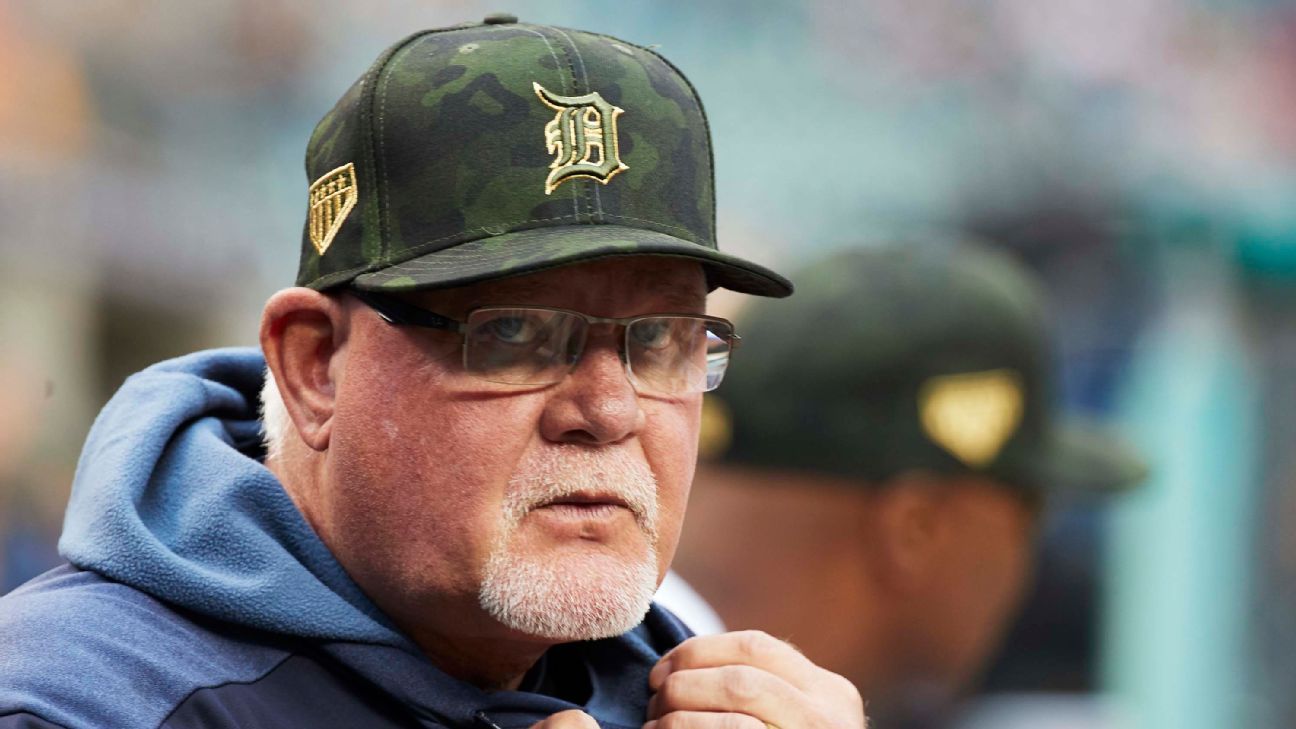
DETROIT -- Ron Gardenhire was ejected from the Detroit Tigers' game against the Miami Marlins on Tuesday night after the Tigers' manager came out to argue following a replay reversal in the bottom of the ninth inning.
With men on first and third and one out, Detroit's Ronny Rodriguez lifted a fly ball to deep left field. Harold Ramirez appeared to drop it, and a run came home, tying the score at 4-4. But replays showed Ramirez had the ball briefly in his glove before losing control as he tried to transfer it to his throwing hand.
The call was overturned and the batter was ruled out -- although the run still counted. Gardenhire came out to argue with third base umpire Fieldin Culbreth, and although Culbreth didn't make a demonstrative ejection motion, Gardenhire disappeared from view in the dugout, and the Tigers eventually confirmed he'd been tossed.
"Obviously the umpire didn't think he had control. Then we go out and they appealed it, and New York said that somehow he did have control,'' Detroit bench coach Steve Liddle said. "I think that's one of those instances where slow motion can hurt you a little bit, and it looked like it came back to bite us there.''
The Marlins won 5-4 in 11 innings.
The Associated Press contributed to this report.
Tagged under
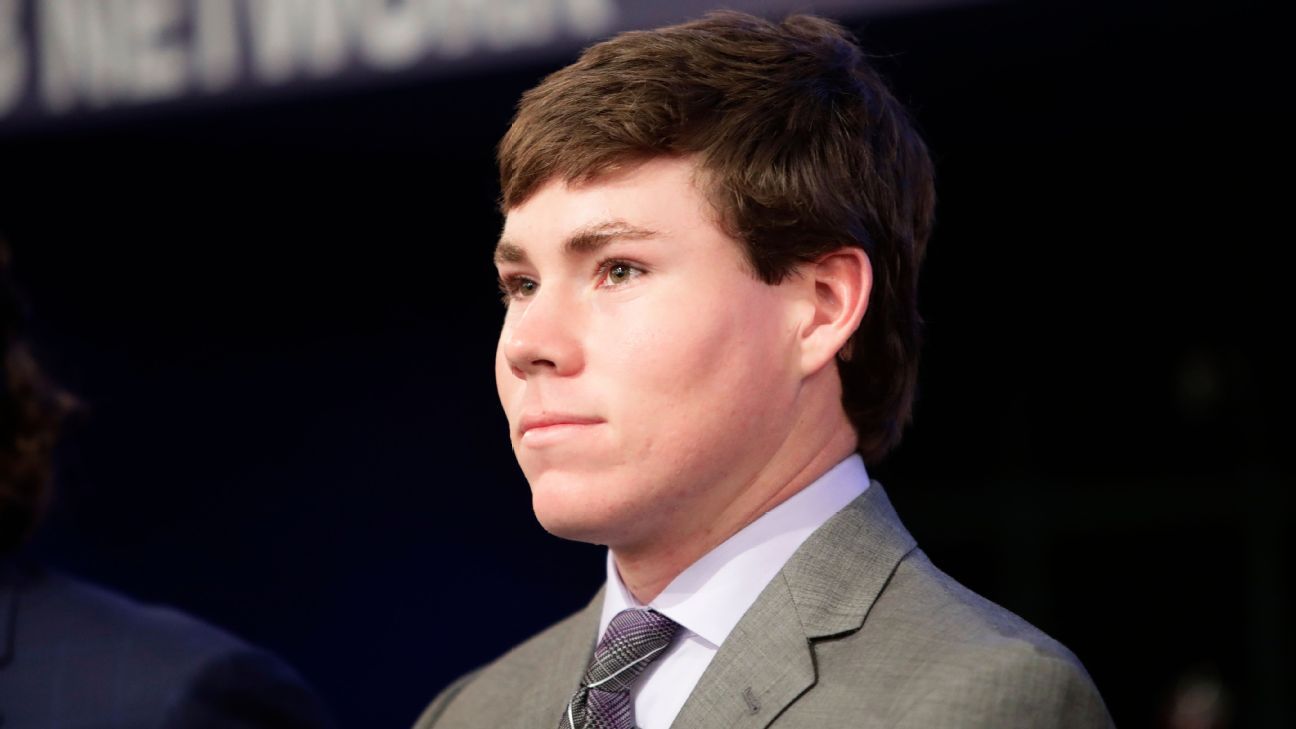
Nineteen-year-old pitcher Carter Stewart is in agreement with the Fukuoka SoftBank Hawks of the Japanese Pacific League on a six-year contract worth more than $7 million, a groundbreaking deal that could have long-term ramifications for Major League Baseball's amateur and professional sides, sources told ESPN.
Stewart, who was chosen by the Atlanta Braves with the eighth pick in the 2018 draft out of a Florida high school but did not sign after they reduced their signing-bonus offer due to an alleged injury, was expected to be chosen in the early second round of this June's draft. By signing with Fukuoka, which has won four of the past five Japan Series, Stewart would guarantee himself significantly more money than he would have made with a major league organization -- and could theoretically join the major leagues as a 25-year-old free agent.
The deal, first reported by The Athletic, is expected to be finalized at the end of the month, according to sources. The 6-foot-6 Stewart, whose fastball sits in the mid-90s and curveball has spun at an elite 3,000 RPMs, would be the first American amateur to join a Japanese team on a long-term deal. Unlike Brandon Jennings and other basketball players who have avoided the NBA's early-entry rule by taking a gap year abroad, Stewart would be committed to the Hawks through the cusp of his 25th birthday.
The contract includes escalators that could take it beyond the $7 million-plus guaranteed. Had he opted to stay in the United States, Stewart likely would have received a bonus of less than $2 million and made even less over the next six years, barring a rapid ascent to the major leagues.
The secondary benefit for Stewart could be even more lucrative: International free agents 25 or older can sign with any major league team without restrictions, so long as their Japanese team enters them into the posting system. Were Stewart to play in Japan for the next six years, sources told ESPN, he would be considered, under the present rules, an international free agent eligible for posting.
Although the limit of four foreign players per Japanese team could stem an influx of American players, elite amateur talent could begin to use the prospect of going to Japan -- not just for the greater guarantee in money but the earlier access to free agency -- as a cudgel in negotiations.
Stewart's agent, Scott Boras, has long tried to use the prospect of taking an amateur player to Japan for leverage purposes. Never until Stewart had one come close to agreeing to a deal. Boras, who has exploited multiple draft loopholes in the past, opted for a 7,500-mile end-around with Stewart.
Stewart is in Japan now and is expected to join a minor league affiliate of the Hawks upon the completion of his deal. At Eastern Florida State College, the junior college where he pitched this spring, Stewart went 2-2 with a 1.70 ERA in 74 1/3 innings and struck out 108.
Tagged under
Passan: How a 19-year-old prospect is turning the MLB draft upside down
Published in
Baseball
Tuesday, 21 May 2019 21:24
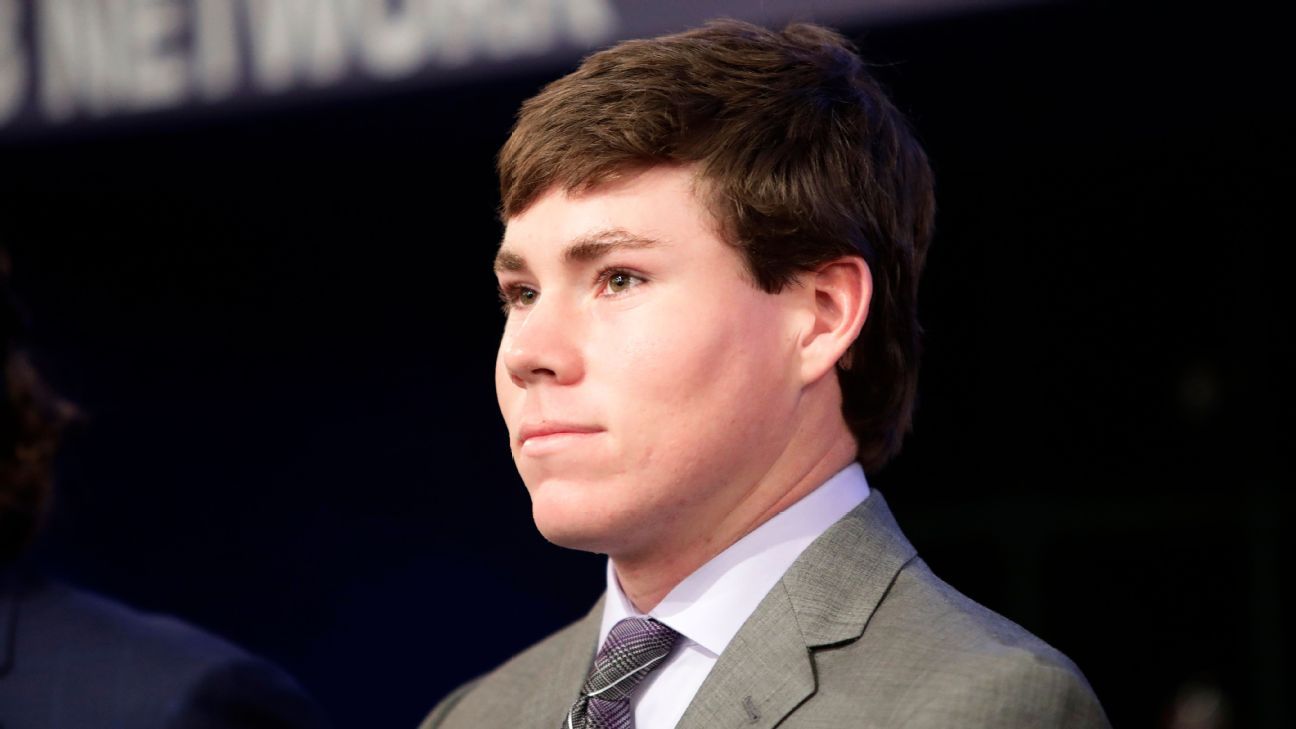
For years, opponents of Major League Baseball's draft who believed it stifled the true value of players have hypothesized about ways to avoid its constraints. Nineteen-year-old Carter Stewart is ready to test the viability of an alternative -- and travel more than 7,500 miles from his Florida home to do it.
Stewart is in agreement on a six-year contract worth more than $7 million with the Fukuoka SoftBank Hawks of Japan's Pacific League, sources familiar with the deal told ESPN. Stewart was the No. 8 overall pick in last year's MLB draft but didn't sign after the Atlanta Braves, who believed he was injured, offered him a signing bonus well under the $4.98 million slot value of the pick -- around $2 million. Stewart went to junior college instead and was expected to go early in the second round of this year's draft -- and receive an offer of less than $2 million.
Instead, he agreed to a groundbreaking contract with the Hawks, who have won four of the past five Japan Series. Stewart is expected to finalize the deal by the end of May. Not only does Stewart stand to make more money during his six years in Japan than he would have with an MLB organization, he could potentially return to the United States as a 25-year-old free agent allowed to sign a long-term contract with any of MLB's 30 teams.
Certainly that is a long way from today, when Stewart is a raw right-handed pitcher with a mid-90s fastball and a curveball that last year flashed elite spin, whirring at more than 3,000 rpm. Still, the value proposition of playing in Japan was alluring enough to convince Stewart to play patient zero and make real what long has been a what-if question bandied about baseball.
The idea of a player decamping to Japan has been floated over the years by agent Scott Boras, who represents Stewart, in an attempt to extract leverage in an amateur draft system without any. Every team is assigned a pool of money to divvy up in signing bonuses, and teams are penalized for exceeding that pool. The rules have essentially capped draft spending.
Stewart's decision makes easy sense financially. Say he stayed in the United States and signed for $2 million. Best case, Stewart would have started with a team's short-season Class A affiliate. In 2020, he would top out at Double-A and make less than $10,000 for the season. And if Stewart is that good, and moving that quickly, his team probably would keep him at scant wages in the minor leagues for all of 2021, too, and promote him around this time in 2022 to ensure it controls him for 6¾ years before free agency. In 2022, 2023 and 2024, Stewart would make the major league minimum -- which, being generous and assuming the new collective bargaining agreement gives it a big bump, could be $750,000.
In a near-optimal scenario, Stewart would receive around $4 million for the next six years -- and would not reach free agency until after the 2027 season, when he will be 28. His deal with the Hawks would guarantee Stewart $3 million more and potentially allow him to hit free agency three years earlier.
MLB's rules require a "foreign professional" to have spent "all or part of at least six seasons" playing in an "MLB-recognized foreign professional league." Even though Stewart is American, sources told ESPN that residency determination for foreign players is based on a number of factors, including where a player has played, where he plans to live, as well as his nationality. Stewart, under current rules, would be considered a foreign professional if he spends the next six seasons in Japan, sources said, though those rules are subject to change.
If they do not, Stewart could at age 25 join MLB via the posting system, which is used to transfer players between the leagues. The system allows foreign professionals 25 and older unrestricted free agency and delivers a fee to their Japanese team that depends upon the size of the contract negotiated with the MLB team.
All of this, of course, is wildly presumptuous. Stewart is 19 years old. He could get hurt. He could lose control of his pitches. He could regress. Pitching prospects are notoriously finicky, and ascribing to him an idealized scenario isn't entirely fair.
It's just a function of the draft's clamping down on players' value for so long. The reason teams place such a premium on draft picks is because the assets gained with those picks carry enormous marginal value. Were Adley Rutschman, the switch-hitting Oregon State catcher widely expected to go No. 1 overall on June 3, a completely unrestricted free agent, teams would line up to pay him at least $50 million -- perhaps upward of $75 million. The slot value of the Baltimore Orioles' No. 1 pick is $8,415,300.
It's no wonder, then, that Boras wants to subvert the draft. For more than 30 years, he has raged against it, whether it was through Tim Belcher not signing in 1983 or Brien Taylor squeezing a record bonus out of the New York Yankees in 1991 or Jason Varitek and J.D. Drew going to independent leagues or the loophole that made four draft picks unrestricted free agents in 1996. This is not so much a loophole as it is an end around -- and one with risk.
Stewart, after all, is a kid from the Space Coast who played baseball at Eau Gallie High School last year and Eastern Florida State College this season. The baseball culture in Japan is markedly different from that of the major leagues, let alone the travel league, high school and juco ball Stewart has played. The Japanese minor leagues, or ni-gun, are even more trying. All of Stewart's physical skills will require complementary mental toughness. On the other hand, the competition will be plenty representative, and by the time he does arrive in the Japanese major leagues, he'll be playing in the finest foreign league on the planet, the best training ground possible for MLB.
If Stewart excels, it could change baseball. Not only is the money better, the marketing opportunities in Japan for baseball players far exceed those in the United States. Other amateur talent could follow -- or at least use the possibility of Japan as a cudgel, potentially forcing MLB to reassess its draft rules. In a tweet more than five years ago, Hiroshi Mikitani, the billionaire owner of the Tohoku Rakuten Golden Eagles, said he hoped Nippon Professional Baseball would loosen restrictions on foreign players, which currently limit each team to four. Perhaps Japanese teams could start recruiting more amateurs in the Dominican Republic, an area MLB monopolizes.
The fact that it took decades for a player like Stewart to agree to such a deal might indicate this is more the exception than the rule. Most 19-year-olds aren't altogether keen on going to a country in which they don't speak the language, learning new customs and figuring out how to thrive in a game as difficult as baseball. Then again, kids from the Dominican Republic and Venezuela and Colombia and all around Latin America do it every day in MLB -- and for far less than the millions Stewart will receive.
Stewart, in the end, is a proxy for something bigger -- a haymaker at a system capable of careening out of control until brought back into balance. Perhaps Stewart is that counterweight. Maybe it's someone after him. Could be that nothing changes and this is but a blip. Whatever the case, it's a noble effort, an admirable risk and a fascinating story, this idea in a vacuum coming to life and playing out 60 feet, 6 inches from home plate and thousands and thousands of miles from home.
Tagged under

The NCAA Division I Women's Championship is underway at Blessings Golf Club in Fayetteville, Arkansas. Here's a look at scoring for the match-play portion of the national championship.
Quarterfinals:
Semifinals:
- 8AM ET: Duke vs. Arizona (No. 1 tee)
- 8AM ET: Wake Forest vs. Auburn (No. 10 tee)
Tagged under
McGregor on Khabib melee: 'This war is not over'
Published in
Breaking News
Tuesday, 21 May 2019 20:11

Conor McGregor opened up about the now-notorious brawl that broke out after his loss to lightweight champion Khabib Nurmagomedov at UFC 229, offering his perspective in detail for the first time in a recently released interview with self-help guru Tony Robbins.
In the interview, which was taped in early-April, McGregor said he felt like he landed the final strike of the night and expressed his desire for a rematch with Nurmagomedov.
"At the end of the day, I landed the final blow of the night, right on his brother's eye socket," McGregor said on Robbins' podcast. "Although the match didn't go my way, the fight went my way. And trust me when I tell you, Tony, this war is not over. If this fight does not happen again, if it does not get reset, it's on them. They're running away. I'm here for the fight and here for the rematch."
Nurmagomedov beat McGregor last October by fourth-round submission. In the immediate aftermath, the violence spilled outside of the Octagon. Nurmagomedov, McGregor and their corner people were later suspended and fined for their roles in the melee by the Nevada State Athletic Commission (NSAC).
After submitting McGregor, Nurmagomedov got into a verbal exchange with McGregor's cornermen, then climbed over the cage and took a running jump toward them. Nurmagomedov and Dillon Danis, a teammate of McGregor's, threw punches at one another while security tried to break things up.
Back inside the cage, McGregor saw what was going on. He ran in the direction of Nurmagomedov and hopped on top of the cage. McGregor was met there by Abubakar Nurmagomedov -- one of Khabib's teammates whom McGregor mistakenly referred to as Khabib's brother -- who was also trying to join the fight outside the Octagon.
"I seen him there, it was like a Christmas present," McGregor said. "He was right there. I just smacked him right in the eye socket. We started fighting on top of the cage. It was broken up."
Once down from the top of the cage, McGregor said he situated himself with his back against the fence in order to see any potential danger coming his way. McGregor said at that point he didn't know who was security and who was in there trying to swing at him.
"What happened was, two of his teammates ran and jumped over [the cage]," McGregor said. "Right behind me. For me, with my mindset, it was fascinating for me to watch back. Because I got to a safe place, I was good. I got to a place where I was aware. I could see any oncoming threat and deal with it. They came right over my back. Right over my back."
The two Nurmagomedov teammates whom McGregor referred to were Zubaira Tukhugov, who engaged in punches with McGregor, and Esedulla Emiragaev, who landed punches to McGregor's head from behind. Security and commission officials separated the parties.
Then Abubakar Nurmagomedov and McGregor got into it again.
"The final one was the original brother who was on top of the cage," McGregor said. "He broke free from the security, ran at 100 miles an hour towards me. He threw a right hand. As he threw the right hand, I threw a left hand. Boom. There's an image, an aerial image, of the right hand just whipping by my face and my left hand just landing flush down the pipe. The final blow of the night. So, that's it. I win."
McGregor, 30, has not fought in the UFC since that brawl. He was suspended six months, retroactive to the day of the fight, and fined $50,000 by the Nevada commission. The NSAC suspended Khabib Nurmagomedov nine months and fined him $500,000. Khabib Nurmagomedov is expected to return in September and defend his title against interim champion Dustin Poirier.
There is no timetable for McGregor's return, and he told Robbins he wants "what I deserve" from the UFC to get back in the Octagon.
"I just want my worth," he told Robbins. "There's a lot of politics in the game. The fight game is full of sharks. But I'm the f---ing whale, so I want what's mine and that's what I'm gonna get -- what I deserve."
McGregor, though, is still angling for a rematch. He said he broke his foot 2 1/2 weeks before UFC 229 when he kicked a training partner who was shooting in for a takedown. McGregor said two of his toes bent backward, and a doctor had to come into the cage and reset them. He said his foot swelled up "like a balloon" and that he probably should have rescheduled the Nurmagomedov fight but chose not to.
"I wanted to compete," McGregor said. "I wanted to get in there."
McGregor admitted to Robbins that he had "lapses in commitment" to fighting leading up to that bout. And the injured foot made it harder for him to cut weight. McGregor said he was severely dehydrated and didn't sleep for 48 hours leading into the weigh-ins.
McGregor added that he felt like his mindset was too defensive in training camp, which goes against his "attacking" style.
"I gave him my respect. Congrats, he won the match," McGregor said of Nurmagomedov. "Let's see what happens next time. I'm confident we'll get it again. Let's go again. I am humble in victory or defeat, no matter what. It's a sport at the end of the day. A gruesome sport, but a sport."
Tagged under
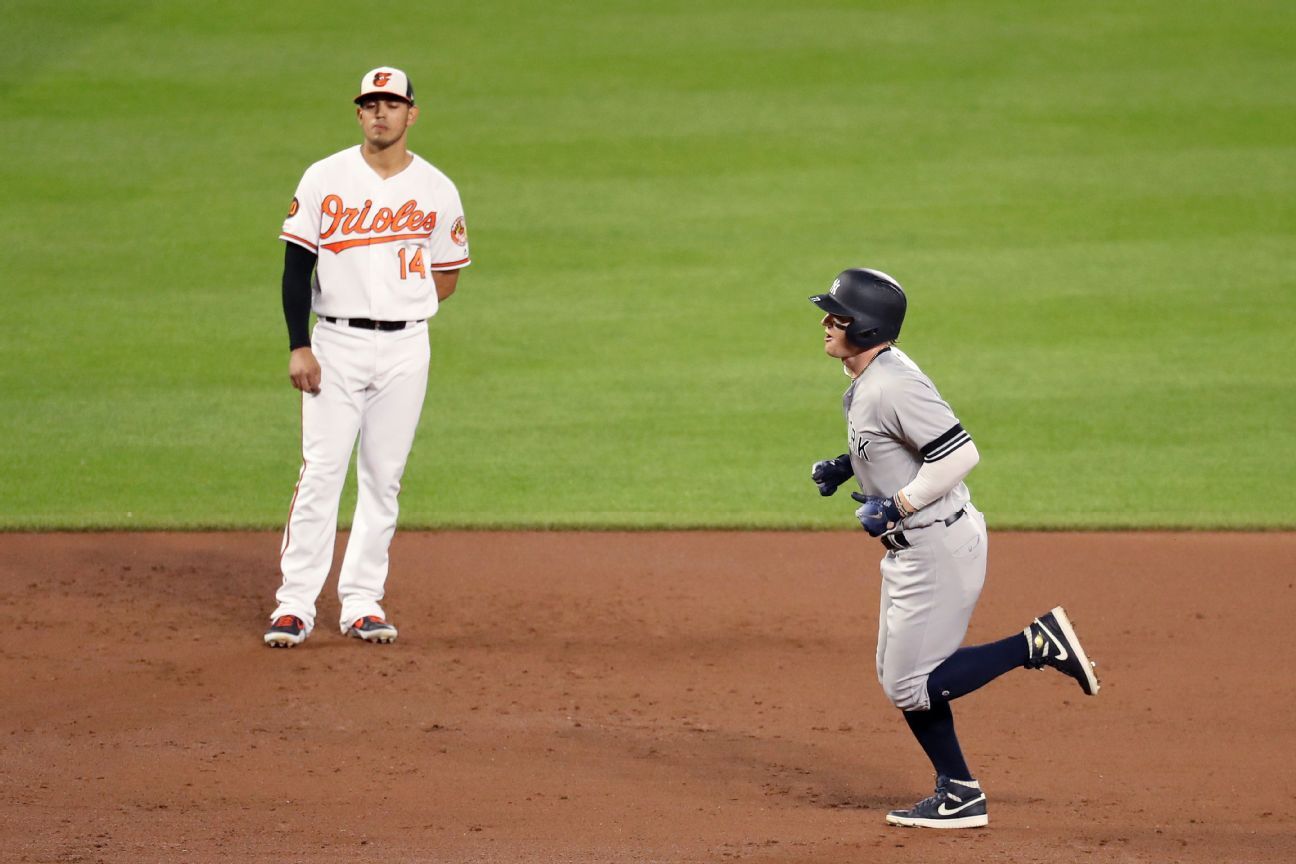
BALTIMORE -- The Baltimore Orioles have reached the century mark.
On Tuesday, the Orioles surrendered their 100th home run of the season, making them the fastest team to ever reach that mark. They achieved the dubious distinction in the fifth inning, when New York Yankees outfielder Clint Frazier drilled a three-run shot to dead center against O's starter David Hess. The home run, which traveled 411 feet and gave New York a 9-0 lead, was Frazier's second of the night and the third allowed by Hess in the game.
Baltimore's pitching staff, which was working its 48th game this season, reached triple digits nine games faster than the 2000 Kansas City Royals, who allowed their 100th home run in their 57th contest. The O's are on pace to surrender 338 homers this year, which would shatter the current record of 258, held by the 2016 Cincinnati Reds.
"We're facing good teams, but you gotta pitch," said Baltimore's rookie skipper Brandon Hyde. "You gotta pitch here. You gotta stay off the barrel. You gotta be able to locate. And if you don't, in a hitter's ballpark against guys that mash, you're going to give up a hundred homers, 40-something games into it."
The Orioles aren't the only ones serving up gopher balls at a record clip this year though. The Seattle Mariners, who've allowed 87 homers in 51 games, are also on pace to surpass the 2016 Reds. Overall, MLB hitters are homering in 3.4 percent of all plate appearances, up from 3.0 percent last season.
More than half of the home runs the Birds have given up this season have been hit by the Yankees and the Minnesota Twins. In 10 games against Baltimore, New York hitters have gone deep 29 times, including 20 times in five contests at Camden Yards. The Twins have 23 bombs in six games against the O's.
Entering play on Tuesday, the Orioles ranked last in the majors with a 5.63 ERA. They owned a .319 winning percentage (15-32) that was second worst, behind the Miami Marlins.
Tagged under

The highest rated player on qualification stage men’s singles duty is Frenchman, Abdel-Kader Salifou, the 29 year old who simmers just below the line of selection for his nation’s first team.
He is quite an anomaly; he was not selected for the recent Liebherr 2019 World Championships, yet he has won more ITTF World Tour men’s singles titles than any other Frenchman!
Notably from the squad of players that saw France gain the silver medal in the men’s team event at the 1997 World Championships in Manchester, Jean-Philippe Gatien and Patrick Chila alongside the erstwhile reserve, Nicholas Chatelain never won. Meanwhile for the remaining members of the quintet, Christophe Legout and Damien Eloi, they have one each to their name. Christophe Legout succeeded on home soil in Lyon in 1997, Damiel Eloi one year later in Sweden.
Fast forward to last month in Budapest, the selection read: Can Akkuzu, Tristan Flore, Simon Gauzy and Emmanuel Lebesson. All are players who have enjoyed noteworthy success but none has an ITTF World Tour men’s singles title in their curriculum vitae.
The one other player who joins the French club of one title to his name is that of Antoine Hachard; he won in 2016 in Santiago.
Now compare those records with Abdel-Kader Salifou; in 2013 he won in Morocco, Egypt and Croatia. He has won three times more than any of his compatriots!
Accepted they were all Challenge Series tournaments but since the Challenge Series became a separate entity in 2017, no Frenchman has won!
In 2017, Tristan Flore was the runner up in Croatia; in 2018 Antoine Hachard experienced the same fate in Nigeria before just over two weeks ago Abdel-Kader Salifou was the silver medallist in Serbia. He was beaten in the final by England’s Paul Drinkhall, the no.12 seed and the highest seeded player this month to win a Challenge Series men’s singles tournament.
The following tournament, Croatia’s Wei Shihao, required to qualify, prevailed in Slovenia, two days ago Sweden’s Anton Källberg, the no.32 seed, succeeded in Zagreb. All were outsiders for honours.
Just as in Serbia, Abdel-Kader Salifou starts in the qualification tournament; can he repeat his performance and reach the final? Moreover, can he climb one step higher?
Judging by the results of earlier this month, it’s not beyond the bounds of possibility, the door is wide open.
Tagged under

Tagged under















 Phone: (800) 737. 6040
Phone: (800) 737. 6040 Fax: (800) 825 5558
Fax: (800) 825 5558 Website:
Website:  Email:
Email: 






